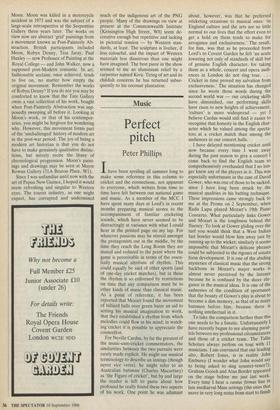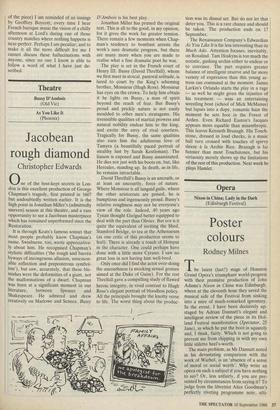Music
Perfect pitch
Peter Phillips
Ihave been spoiling all summer long to make some reference in this column to cricket and the connections, not apparent to everyone, which writers from time to time have felt between our national game and music. As a member of the MCC I have spent many days at Lord's in recent months preparing musical scores to the accompaniment of familiar cricketing sounds, which have never seemed to be distractingly at variance with what I could hear in the printed page on my lap. For whatever passions may be stirred amongst the protagonists out in the middle, by the time they reach the Long Room they are muted and reduced to the point where the game is perceivable in terms of the essen- tially musical attribute of rhythm. This could equally be said of other sports (and of one-day cricket matches), but in these the rhythm is so enlivened by restrictions on time that any comparison must be to other kinds of music than classical music. As a point of reference, it has been reported that Mozart found the movement of billiard balls over green baize an aid to setting his musical imagination to work, that they established a rhythm from which melodies could flow in his mind; in watch- ing 'cricket it is possible to appreciate the connection.
For Neville Cardus, by far the greatest of the music-cum-cricket commentators, the similarities between the two pursuits were rarely made explicit. He might use musical terminology to describe an innings (though never vice versa), he might refer to an Australian batsman (Charles Macartney) as 'the Figaro of cricket', but by and large the reader is left to guess about how profound he really found these two aspects of his work. One point he was adamant about, however, was that he preferred cricketing occasions to musical ones: 'in England culture and the arts are so little normal to our lives that the effort even to get a hold on them tends to make for arrogance and exclusiveness.' The result, for him, was that as he proceeded from Lord's to Covent Garden he felt 'an acute lowering not only of standards of skill but of genuine English character; for taking them as a whole, concert and opera audi- ences in London do not ring true. . . . Cricket in time proved my salvation from exclusiveness.' The situation has changed since he wrote those words during the second world war — our cricketing skills have diminished, our performing skills have risen to new heights of achievement, `culture' is more widespread — yet I believe Cardus would still find it easier to recognise that honesty in the English char- acter which he valued among the specta- tors at a cricket match than among the audiences in our concert halls.
I have delayed mentioning cricket until now because every time I went away during the past season to give a concert I came back to find the English team so comprehensively overhauled that I no lon- ger knew any of the players in it. This was especially unfortunate in the case of David Gower, who was one of those to be sacked, since I have long been struck by the musical qualities in his batting technique. These impressions came strongly back to me at the Proms on 2 September, when Radu Lupu played Mozart's 19th Piano Concerto. What particularly links Gower and Mozart is the toughness behind the fluency. To look at Gower gliding over the turf you would think that a West Indian fast bowler would blow him away just by running up to the wicket; similarly it seems impossible that Mozart's delicate phrases could be subjected to the rigours of sonata form development. It is one of the abiding mysteries of classical music that the strong backbone in Mozart's major works is almost never perceived by the listener because he is confused by the sheer ele- gance in the musical ideas. It is one of the sadnesses of the condition of sportsmen that the beauty of Gower's play is about to become a dim memory, as that of so many batsmen before him, because there is nothing intellectual in it. To take the comparison further than this one needs to be a fanatic. Unfortunately I have recently begun to see alarming paral- lels between my professional circumstances and those of a cricket team. The Tallis Scholars always perfom on tour with 11 musicians. I am convinced that our leading alto, Robert Jones, is in reality John Emburey (I wonder what John would say to being asked to sing counter-tenor?); Graham Gooch and Alan Border appeared on the stage before me just last week. Every time I hear a cantus firma line in late mediaeval Mass settings (the ones that move in very long notes from start to finish of the piece) I am reminded of an innings by Geoffrey Boycott; every time I hear French baroque music the vision of a chilly afternoon at Lord's during one of those country matches where nothing happens is near-perfect. Perhaps I am peculiar; and to make it all the more difficult for me I cannot discuss these hallucinations with anyone, since no one I know is able to follow a word of what I have just de- scribed.























































 Previous page
Previous page